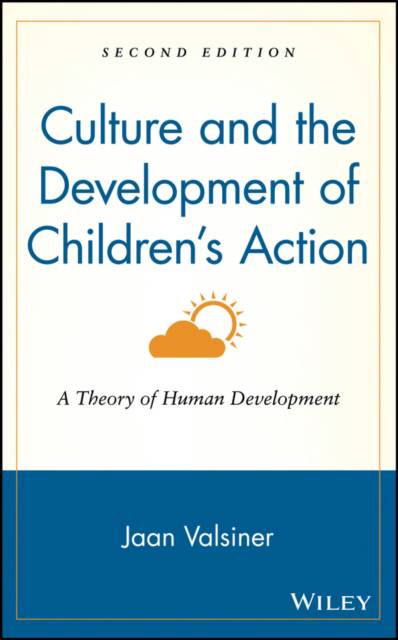
- Retrait gratuit dans votre magasin Club
- 7.000.000 titres dans notre catalogue
- Payer en toute sécurité
- Toujours un magasin près de chez vous
- Retrait gratuit dans votre magasin Club
- 7.000.0000 titres dans notre catalogue
- Payer en toute sécurité
- Toujours un magasin près de chez vous
Culture and the Development of Children's Action
A Theory of Human Development
Jaan Valsiner
Livre relié | Anglais
164,45 €
+ 328 points
Description
In this deeply probing, intellectually challenging work, Dr. JaanValsiner lays the groundwork for a dynamic new cultural-historicalapproach to developmental psychology. He begins by deconstructingtraditional developmental theory, exposing the conceptual confusionand epistemological blind spots that he believes continue toundermine the scientific validity of its methodologies. Hedescribes the ways in which embedded cultural biases shapeinterventional goals and influence both the direction researchtakes and the ways in which research data are interpreted. And hesuggests ways in which researchers and clinicians can become moreaware of and transcend those biases. Dr. Valsiner then develops a hierarchical, systemic model thatportrays development as an open-ended, dialectical process. Centralto Valsiner's approach is the premise that, since each child isunique--as are his or her life conditions--deviations in functionor the rate of development from a prescribed norm are just aslikely to be constructive adaptations to changing environmentalpressures as symptoms of psychological disorder. Drawing uponsources as varied as linguistic philosophy, structuralanthropology, thermodynamics, and systems theory, as well as thework of many of the leading figures in twentieth-centurydevelopmental theory, Valsiner argues convincingly for an approachto developmental psychology mature enough to recognize thedifference between healthy variability and dysfunction. In later chapters the focus shifts from development in the abstractto the everyday challenges encountered by the developing child.Case histories illustrate the subtle interplay of cultural, physiological, and psychological factors in shaping childhoodbehavior. Called an "intellectual tour de force" by the Bulletin of theMenninger Clinic, Culture and the Development of Children's Actionis important reading for developmental psychologists, childpsychologists, and all child clinicians. "Of course, no science progresses in a linear fashion. It movesinterdependently with the society in which it is embedded, makinguse of the narrative forms in describing itself to its insiders andoutsiders. The rhetoric of scientists about their science istherefore necessarily inconsistent. Sciences are both socialinstitutions within a society and social organizations that attemptto build universal knowledge. It is a complicated task forpsychology to be both knowledge-constructing and self-reflexive atthe same time. Nevertheless, it is the latter kind of reflexivitythat guides the actual construction of knowledge." -- JaanValsiner "[This book] is a fascinating and important work that challengesmuch of contemporary developmental psychology. The Second Editionhas changed in a number of respects, and much new material has beenadded, but at root, Valsiner grapples with the question 'how shallwe understand development?' He continues to struggle also with whathe describes rather vividly as the 'epistemological windmills ofpsychology.' His challenge is summed up succinctly in two linesfrom a poem by T. S. Eliot:
* Where is the wisdom we have lost in knowledge?
* Where is the knowledge we have lost in information?" -- -- fromthe Foreword by Kevin Connolly
* Where is the wisdom we have lost in knowledge?
* Where is the knowledge we have lost in information?" -- -- fromthe Foreword by Kevin Connolly
Spécifications
Parties prenantes
- Auteur(s) :
- Editeur:
Contenu
- Nombre de pages :
- 384
- Langue:
- Anglais
Caractéristiques
- EAN:
- 9780471135906
- Date de parution :
- 23-06-97
- Format:
- Livre relié
- Format numérique:
- Genaaid
- Dimensions :
- 163 mm x 237 mm
- Poids :
- 703 g

Les avis
Nous publions uniquement les avis qui respectent les conditions requises. Consultez nos conditions pour les avis.






